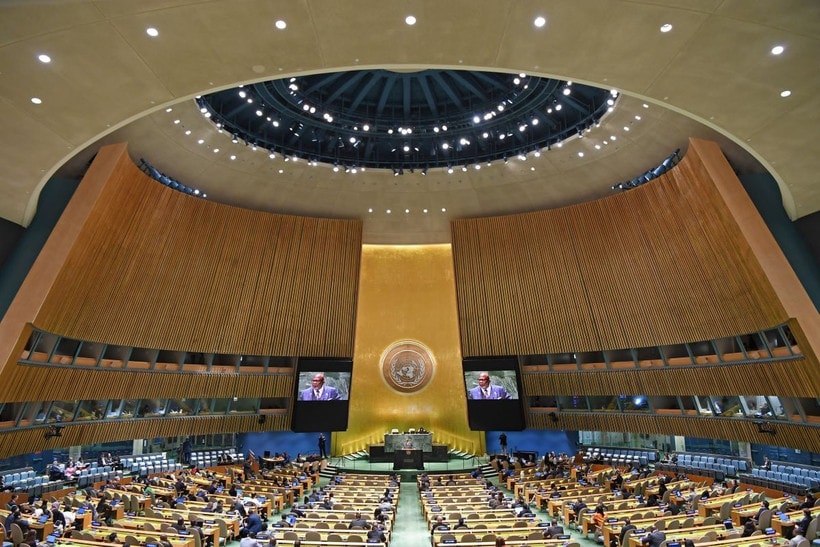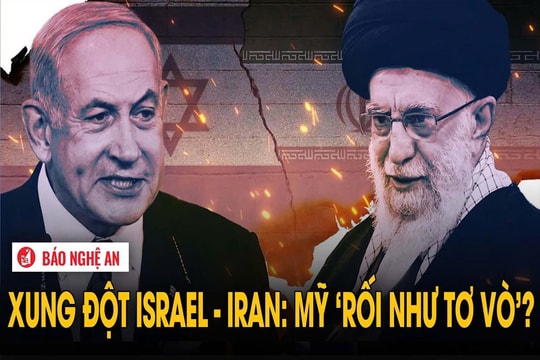United Nations celebrates 80th birthday in 'storm'
As the United Nations turns 80, it faces one of the biggest crises in its history. Severe cuts in funding, especially from the United States, and deep political divisions are choking the work of aid agencies...

At a refugee camp in northern Kenya, Aujene Cimanimpaye waits for a hot lunch of lentils and sorghum to be ladled out for her and her nine children — all born while she has been receiving assistance from the United Nations since fleeing her violence-torn homeland in Congo in 2007.
"We can't go home because people are still being killed," the 41-year-old said at Kakuma camp, where the World Food Programme (WFP) and the UN refugee agency are assisting more than 300,000 refugees.
Her family moved from Nakivale Refugee Resettlement Area in neighboring Uganda to Kenya three years ago, which is now home to more than 1 million refugees from conflict-affected East African countries.
A few kilometers away, in the Kalobeyei Refugee Resettlement Area, another Congolese refugee, Bahati Musaba, a mother of five, said that since 2016, “UN agencies have supported my children’s education — we receive food, water, and even medicine,” as well as cash assistance from WFP to buy food and other essentials.
This year, those cash transfers — and many other U.N. aid operations — have ground to a halt, threatening to disrupt or endanger the lives of millions of people.
As the United Nations celebrates its 80th anniversary this month, its humanitarian agencies are facing one of the biggest crises in their history: its largest donor — the United States — under the Trump administration and other Western donors has sharply cut international aid spending. Some want to use that money to build up defenses.
A diplomat from a top donor country, speaking on condition of anonymity so he could comment freely on the financial crisis facing some UN agencies, said some UN agencies were increasingly criticizing each other as they vied for a shrinking pool of funds.
Such pressures undermine the pivotal role the United Nations and its partners play in saving millions of lives — by providing tents, food and water to people fleeing turmoil in places like Sudan and Syria, or helping to eradicate smallpox decades ago, humanitarian groups say.
“In my 40 years as a humanitarian worker, this is by far the most abrupt disruption to the UN humanitarian work,” said Jan Egeland, former UN humanitarian aid chief and now head of the Norwegian Refugee Council. “And it will widen the gap between the exploding need and the aid contributions.”
"Devastating" cuts to humanitarian aid programs
UN Secretary-General Antonio Guterres has asked heads of UN agencies to look for ways to cut staff by 20%, and his New York office has floated sweeping reform ideas that could dramatically reshape how the UN delivers aid.
Humanitarian workers often face danger and go where many others don't—to slums to collect data on emerging viruses or drought-stricken areas to provide water.
The United Nations said 2024 was the deadliest year on record for humanitarian workers, largely due to the war in Gaza. In February, the organization suspended aid operations in the stronghold of Houthi forces in Yemen, who have captured dozens of U.N. and other aid workers.
Supporters say UN aid operations have helped millions of people around the world affected by poverty, disease, conflict, famine and other problems.
Critics say many operations have become cumbersome, riddled with bureaucratic privileges and lack of accountability, and too disconnected from real needs. They say post-colonial Western aid has fostered dependency and corruption, stunting countries’ ability to develop on their own, while U.N.-backed aid programs that are supposed to have specific deadlines have dragged on for years with no clear end point.
In the case of the Nobel Peace Prize-winning WFP and the UN refugee and migration agencies, the US accounts for at least 40% of their total budgets, and the Trump administration’s cuts of about $60 billion in US foreign aid have dealt a major blow. Each UN agency has had to cut thousands of jobs and review aid spending.
"What has happened is devastating," Egeland said, referring to cuts that have shocked the global aid community. "But it has forced us to prioritize... what I hope is that we will be able to move more resources to the front lines of humanity and have fewer people sitting in offices talking about it."
With the UN Security Council divided over wars in Ukraine and the Middle East that have hampered its ability to prevent or end conflicts in recent years, humanitarian efforts to vaccinate children against polio or provide shelter and food to refugees were once a bright spot in UN activity. But now that bright spot is fading.
Not just funding cuts...
In addition to the cuts and dangers humanitarian workers face, political conflicts have sometimes overshadowed or hindered their work.
UNRWA, the relief agency for Palestinian refugees, has provided a range of services to millions of people — food, education, employment and more — in Lebanon, Syria and Jordan as well as in the West Bank and Gaza since its founding in 1948.
Israel claims that the agency's schools spread anti-Semitic and anti-Israeli ideology, which the agency denies. Israel says Hamas siphons off UN aid in Gaza for its own gain, while UN officials insist most aid goes directly to those in need.
"UNRWA is like one of the foundations of your house. If you remove it, everything will collapse," said Issa Haj Hassan, 38, after a check-up at a small clinic in Beirut's Mar Elias Palestinian refugee camp.
UNRWA pays for the man’s diabetes and blood pressure medication, as well as his wife’s heart medication. The United States, Israel’s top ally, has stopped contributing to UNRWA; it previously provided a third of the agency’s budget. Earlier this year, Israel banned the aid group, but it has tried to continue its work.
"Without UNRWA, we would starve... They helped build my house, and they provide health care. My children go to their school," said Ibtisam Salem, a 50-year-old single mother of five who shares a small one-room apartment in Beirut with relatives who sleep on the floor.
Especially when it comes to food and hunger, global needs are growing even as funding to address them dwindles.
“This year, we estimate that there are about 343 million people who are acutely food insecure,” said Carl Skau, deputy executive director of WFP. “That’s a threefold increase if we compare it to four years ago. And this year, our funding is down 40%. So clearly it’s not an easy equation to solve.”
Billing itself as the world's largest humanitarian organization, the WFP has announced plans to cut about a quarter of its 22,000 staff.
The changing aid landscape
One question is how the United Nations can remain a provider of aid when global cooperation is in decline and national interests and self-defense are in the ascendancy.
The UN is not alone: many of its aid partners are also feeling the squeeze. Groups like GAVI, which tries to ensure equitable distribution of vaccines around the world, and the Global Fund, which spends billions of dollars a year to help fight HIV, tuberculosis, and malaria, have been hit by the Trump administration’s budget cuts to the US Agency for International Development (USAID).
Some government-backed private groups are also emerging, including the controversial Gaza Humanitarian Fund, which has been providing some food to Palestinians. But violence has broken out when crowds have tried to reach the distribution sites.
No private donor or wealthy country — including China and the oil-rich Gulf states often mentioned by aid groups — has filled the significant gaps left by shrinking spending by the United States and other Western countries.
The future of UN aid, experts say, will depend on where it belongs — the organization's 193 member states.
“We need to bring that debate back to our countries, to our capitals, because it is there that you can empower the United Nations to act and succeed — or you paralyze it,” said Achim Steiner, director of the United Nations Development Programme.




.jpg)
